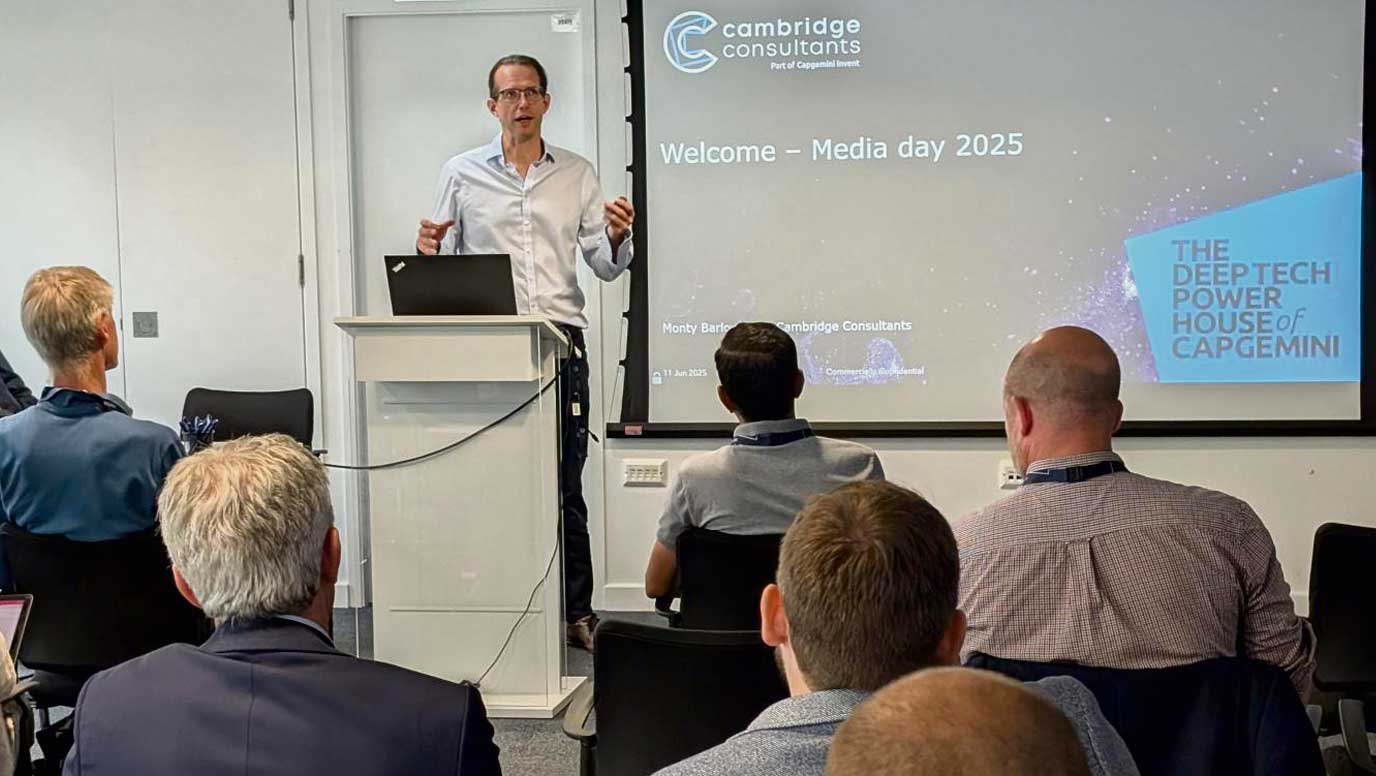Cambridge edge from in-body AI to outer space

The companies are working with global giants such as Nvidia and Microsoft, top surgeons and leading actors in other major tech fields which will result in mind-blowing innovation across the board.
Business Weekly was handed the inside track in a special media day staged by the businesses at their Cambridge Science Park HQ last week.
The focus in AI & robotics is particularly impressive - not to mention the Euros 2 billion-plus investment in research which have contributed to more than 1,000 ongoing or delivered client projects. The precise nature of experimentation is client sensitive but through its pioneering team at Cambridge Consultants, Capgemini is positioning itself as a genuine leader in bioengineering and DeepTech innovation.
The approach emphasises the transformative potential of engineering biology in addressing global challenges.
Capgemini’s Pascal Brier, who stressed the need to keep innovating to stay alive and stay ahead, said the companies were working beyond Agentic AI. A session for chosen media showed that the next evolution of AI was physical, drawing on new data, and enabled leaps towards artificial common sense and solves fundamental human challenges. The door was now open to physical, embodied AI and a whole new future of lab automation and physical embodiments of AI for real-life improvements, team leaders explained.
Quantum technology, an area in which Cambridge is a genuine world leader, was also under the metaphorical microscope.
The team demonstrated that quantum was a practical and business-ready tool and not just science fiction. It had real-world use cases in security, drug discovery and algorithm development and was already a strategic differentiator for clients today, rather than holding out a distant future promise. Researchers showed why now was the time to seize the value of quantum using DeepTech thinking.
The Cambridge team’s work in the area of SpaceTech is simply staggering. The work here is redefining connectivity as the backbone of intelligent industry, from legacy innovations like Bluetooth (let’s not forget here the pioneering work in Bluetooth of Cambridge Consultants spin-out Cambridge Silicon Radio which was acquired by Qualcomm) to cutting edge advances in non-terrestrial networks and beam forming. Watch out Elon Musk and SpaceX is all I would say here.
The work at the Science Park nervecentre on biotechnology - arguably Cambridge’s hottest area of TechBio - is potentially fuelling a DeepTech Industrial Revolution. Truly transformational, as the Cambridge Consultants team explained, this revolution will bring new biofuels and more renewable energy production. It could redefine food production, agriculture, healthcare, ClimateTech and more.
Industrial biotech, in turn, promises to remove petrochemical ingredients from the chemicals, materials and fuels in everyday products. It can also be used to manufacture foods from more sustainable sources that don’t require animal-derived ingredients.
Why is Cambridge Consultants and its Capgemini backers important in the process? Because they recognise the true power at the heart of this revolution: that progress depends on understanding new biomanufacturing processes – from biocatalysts to fermentation and microorganisms. Next comes the need to navigate complex regulatory hurdles.
The two partners can guide clients on the path to new supply chain economics and business models. And if they are already engaged in bio transformation but hitting a snag, their biotech consultancy services cover biology, AI, manufacturing and product development in one holistic package.
CEO Monty Barlow, who has been with Cambridge Consultants for a great many years, is thrilled that in Capgemini and its track record of having more than 500,000 patents, the company has a partner in spirit and practice. They appreciate where Cambridge Consultants has been and where the partners want to go in terms of future technological discovery.
In such a hive so rich with honey one hesitates to focus on any one area of research but the Cambridge team’s use of AI to advance the work of surgeons is simply mind-boggling.
With CMR Surgical in Cambridge, for example, so successful these days in the area of keyhole surgery with its ever-advancing Versius robot arm, one foresees a future where surgeons will be able to use Cambridge Consultants technology to save more lives and improve the quality of so many others.
If America thought it had a lead in this field, a glance over their shoulder with one eye and a peek into the future with the other might loosen their cloak of complacency.


